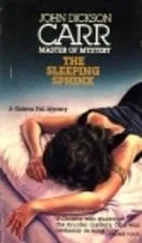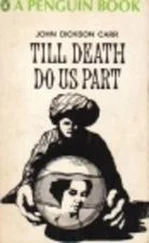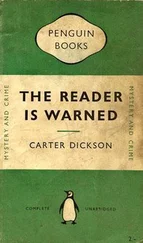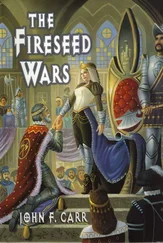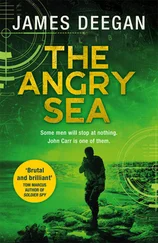'Ever see this suit before?' questioned H.M. 'Hand it up to him.'
'Yes, sir,' said Dyer, after a pause. 'It is a golf-suit belonging to Dr Spencer Hume.'
'Dr Hume not bein' within call, I presume you can identify it? So. Is that the suit you were lookin' for on the night of the murder?'
‘It is.'
'Now just feel in the right-hand coat pocket. What do you find there?'
'An ink-pad and two rubber stamps,' said Dyer, producing them.
'Is that the ink-pad you were lookin' for on the night of the murder?' 'It is.'
'Good. We got some other stuff here,' continued H.M. off-handedly: 'laundry, and a pair of Turkish slippers, and the like; but that'd be out of your province. We can get it properly identified by Miss Jordan. But tell me if you can identify this?'
This time there was produced a large oblong suitcase of black leather, having the initials stamped in gold on the flap beside the handle.
'Yes, sir,' replied Dyer, stepping back a little. 'It is undoubtedly Dr Hume's. I believe it is the one Miss Jordan packed for Dr Hume on the night of the - circumstance. Both Miss Jordan and I forgot all about it; or at least -she having been very ill afterwards; and, when she asked me what had happened to it, I could not remember. I have not seen it since.'
'Yes. But here's just one more thing that you're the one to identify. Look at this cut-glass decanter, stopper and all. You'll see it's full of whisky except for about two drinks poured out. Ever see it before?'
For a moment I thought H.M. had got hold of one of the prosecution's own exhibits. The decanter he produced was indistinguishable from the one the Crown had put in evidence. Evidently Dyer thought so too.
'It looks -' said the witness. 'It looks like the decanter which Mr Hume kept on the sideboard in the study. Like - that other -'
'It does. It was meant to. Between those two, could you swear which was which?' 'I'm afraid not, sir.'
'Take one in each hand. Can you swear that my decanter, in your right hand, is not the real one you bought from Hartley's of Regent Street; and that the first exhibit, in your left hand, ain't a copy in inferior glass?'
'I do not know, sir.'
'No more questions.'
Three witnesses then passed in rapid succession, being not more than five minutes in the box among all of them. Mr Reardon Hartley, of the firm of Hartley and Son, Regent Street, testified that what H.M. called 'my’ decanter was the original one supplied by him to Mr Hume; the prosecutor's exhibit was a copy which Avory Hume had bought on Friday afternoon, January 3rd. Mr Dennis Moreton, analytical chemist, testified to having examined the whisky in 'my' decanter, and to having discovered in. it one hundred and twenty grains of brudine, a derivative of scopolamine. Dr Ash ton Parker, Professor of Applied Criminology at the University of Manchester, gave the real evidence of the three.
‘I examined the cross-bow there, which I was told belonged to Avory Hume. In the groove down the centre of the cross-bow, evidently used for the reception of a missile - here,' said Dr Parker, indicating, 'the microscope showed flakes of what I believed to be dry paint. I judged that these flakes had been rubbed off owing to the sudden friction when some wooden missile was fired from the bow. Under analysis, the paint was ascertained to be a substance known as "X-varnish", used exclusively by Messrs Hardigan, who sold to the deceased the arrow in question. I present an affidavit to that effect.
'The arrow here was - ah - kindly lent to me by Detective-Inspector Mottram. Here the microscope showed along the shaft of the arrow signs that flakes of paint had been chipped in an irregular line from it.
'In the teeth of the windlass on the cross-bow I found the piece of blue feather which you see there now. This I compared to the broken feather on the end of the arrow. The two pieces made up a complete feather, except for an irregular bit which was missing. I have here photomicrographs of the two pieces, enlarged ten times. The joinings in the fibre of the feather can be seen clearly, and leave no doubt in my own mind that they came from the same feather.'
'In your opinion, had the arrow been fired from this cross-bow?'
'In my opinion, it unquestionably had.'
This was hard hitting. Under cross-examination, Dr Parker acknowledged the scientific possibility of an error; it was as far as he would go.
'And I acknowledge, my lord,' said H.M. in reply to a question from the bench, 'that so far we've not shown where this cross-bow or the other articles came from, or what happened to the missin' piece of feather. We'll remedy that now. Call William Cochrane.'
('Who on earth is that?' whispered Evelyn. H.M. had said once before that you would no more cause a commotion in Balmy Rankin's court than you would cause one on a chess-board; but the curiosity of the court had now reached to as flaming a pitch as it could go. It was stimulated still more by the quietly dressed elderly man who took the oath.)
'Your full name?'
'William Rath Cochrane.'
'What's your profession, Mr Cochrane?'
'I am the manager of the Left-Luggage Department at Paddington Station - the Paddington terminus of the Great Western Railway.'
'I think we all know the process,' rumbled H.M., 'but I'll just go over it here. If you want to leave a bag or a parcel or the like for a few hours, you hand it across a counter, and you get back a written slip that allows you to claim the parcel again?'
'That is right.'
'Can you tell the date and the time of day when the parcel was handed in?'
'Oh, yes. It is on the ticket.'
'Now, suppose,' said H.M. argumentatively, 'a parcel is handed in, and nobody comes to claim it. What happens to the parcel?'
'It depends on how long it has been left there. If it seems to have been left there indefinitely, it is transferred to a storage-room reserved for that purpose. If it is not claimed at the end of two months, it may be sold and the proceeds devoted to railway charities; but we make every effort to find the proper owner.'
'Who is in charge of this department?'
'I am. That is to say, it is under my direction.'
'On February 3rd, last, did anybody come to your office and enquire about a suitcase which had been left there at a certain definite time on a certain definite date?'
'Yes. You did,' replied the witness with a shadow of a smile.
'Was there anyone else present?'
'Yes, two others whom I now know to be Dr Parker and Mr Shanks.'
'A week after we had been there, did another person - another person in this case - also call and enquire about it?'
'Yes; a man who gave the name of -'
'Never mind the name,' said H.M. hastily. 'That's not our business. But about the first people who asked for it. Did you open the suitcase in their presence?'
'Yes, and I was convinced that the suitcase belonged to one of them,' said Cochrane, looking hard at H.M. 'The contents of the suitcase, not usual contents, were described before the suitcase was opened.'
H.M. indicated the big black-leather suitcase inscribed with Spencer Hume's initials. 'Will you look at that and tell us whether it's the suitcase?'
'It is.'
'I'd also like you to identify some other articles that were in the suitcase at the time. Hand them up as I indicate. That?' It was the golf-suit. 'Yes. These?' An -assortment of wearing apparel, including a pair of gaudy red-leather slippers. 'This?' Up went the decanter H.M. had put in in evidence, the decanter containing drugged whisky from which two drinks were gone. 'This?'
'This was a syphon of soda-water with its contents depleted perhaps two, inches. Next came a pair of thin gloves in whose lining the name Avory Hume had been written in indelible ink. Next came a small screw-driver. Next, in order, two drinking-glasses and a small bottle of mint extract.
Читать дальше

